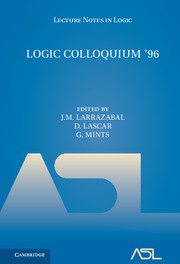Book contents
- Frontmatter
- Preface
- Contents
- The Logical Foundations of Discourse Interpretation
- Complete Sets and Structure in Subrecursive Classes
- Kernels and cohomology groups for some finite covers
- On “star” schemata of Kossak and Paris
- Arithmetizing proofs in analysis
- Satisfaction classes and automorphisms of models of PA
- Free monoid completeness of the Lambek calculus allowing empty premises
- Simple groups definable in O-minimal structures
- Two-Dimensional Temporal Logic
- Rather Classless, Highly Saturated Models of Peano Arithmetic
- Incompleteness theorems and Si2 versus Si2
The Logical Foundations of Discourse Interpretation
Published online by Cambridge University Press: 24 March 2017
- Frontmatter
- Preface
- Contents
- The Logical Foundations of Discourse Interpretation
- Complete Sets and Structure in Subrecursive Classes
- Kernels and cohomology groups for some finite covers
- On “star” schemata of Kossak and Paris
- Arithmetizing proofs in analysis
- Satisfaction classes and automorphisms of models of PA
- Free monoid completeness of the Lambek calculus allowing empty premises
- Simple groups definable in O-minimal structures
- Two-Dimensional Temporal Logic
- Rather Classless, Highly Saturated Models of Peano Arithmetic
- Incompleteness theorems and Si2 versus Si2
Summary
A central but still unsettled question in formal theories about discourse interpretation is: What are the key theoretical structures on which discourse interpretation should depend? If we take our cue from theories that analyze the meanings of individual sentences, the meaning of the discourse's parts should determine the meaning of the whole; some sort of principle of compositionality of meaning must hold at the level of discourse interpretation. So a theory of discourse interpretation must develop from an account of discourse structure.
Unlike the syntactic structure of a sentence, the discourse structure of a text is not a structure studied by syntacticians or governed principally by syntactic concerns. It has to be inferred from a variety of knowledge sources. Recent work on discourse structure in AI, philosophy and linguistics has shown that discourse structure depends on numerous information sources— compositional semantic principles, lexical semantics, pragmatic principles, and information about the speaker's and interpreter's mental states. So a theory of discourse interpretation must in fact also be a theory of semantics and pragmatics and their interaction—a theory of the pragmatics-semantics interface.
Such a theory linking together pragmatics and semantics brings up a foundational question about frameworks. Pragmatics, though not often formalized, has often made appeal to different types of logical principles than semantics. While semantic theories have typically used a classical, monotonic, logical framework, pragmatic theories appear to best couched within nonmonotonic logic. How should we model the interaction of these multiple knowledge sources needed to construct discourse structure, or the interaction between defeasible pragmatic principles and nondefeasible semantic principles?
Another fundamental difference between pragmatics and semantics also requires resolution. The model-theoretic approach to semantics is thoroughly entrenched, whereas in pragmatics appeals are often made to representations of information, beliefs and other mental states of the participants. How should a discourse context be thought of—as a structured representation, or model-theoretically? How should we model in a logically precise fashion the updating of discourse contexts with new information?
One of the good things about recent developments in theories of discourse interpretation is that we know at least some of the answers to these questions. I will try to provide a guide to some strategies for building such theories.
- Type
- Chapter
- Information
- Logic Colloquium '96 , pp. 1 - 44Publisher: Cambridge University PressPrint publication year: 2017

